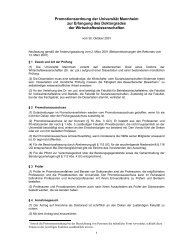Modulkatalog - Abteilung VWL - Universität Mannheim
Modulkatalog - Abteilung VWL - Universität Mannheim
Modulkatalog - Abteilung VWL - Universität Mannheim
Erfolgreiche ePaper selbst erstellen
Machen Sie aus Ihren PDF Publikationen ein blätterbares Flipbook mit unserer einzigartigen Google optimierten e-Paper Software.
Erwartete Kompetenzen<br />
nach Abschluss des<br />
Moduls<br />
The course is organized as follows:<br />
1. Review on perfect competition<br />
2. Review on game theory<br />
3. Monopoly<br />
4. Static oligopoly<br />
5. Dynamic oligopoly and collusion<br />
6. Product differentiation<br />
7. Information<br />
8. Advertising<br />
9. Merger, entry and market structure<br />
10. Network effects<br />
11. Vertical relations<br />
12. Patents and R&D<br />
13. Antitrust<br />
Students acquire a broad knowledge in the field of industrial organization.<br />
They understand, among others, why monopolies harm social welfare, why<br />
price discrimination may benefit final consumers, why firms have incentives<br />
to escape the so-called Bertrand paradox, why collusion becomes harder to<br />
sustain in a shrinking industry, why firms have incentives to differentiate<br />
themselves as much as possible from their competitors, etc. To deal with<br />
these issues, and to solve the relevant theoretical models, students apply<br />
various game theoretical and mathematical tools, such as optimization<br />
methods and multivariate calculus.<br />
Students should not mindlessly memorize the theories presented in this<br />
course, but rather understand where the models come from, and why they<br />
have been developed. They will understand the limitations of these<br />
theories, and how these limitations can be overcome. The focus on modelbuilding,<br />
and not on mindless memorization, will enable students to deepen<br />
their knowledge in the field of industrial organization if they need to do so.<br />
In particular, students will be able to teach themselves theories which are<br />
not dealt with in this course, or to read more advanced research articles.<br />
The field of industrial organization has a lot of real-world applications. For<br />
instance, a graduate working in an antitrust authority will be able to apply<br />
monopoly, oligopoly and cartel theory, when deciding whether to clear a<br />
horizontal merger. A graduate working for a management consulting firm,<br />
or for any corporation, will be able to apply industrial organization theory to<br />
pricing strategy. More generally, this course promotes strategic, analytical<br />
and critical thinking, which is crucial in any professional career.<br />
Graduates are able to apply industrial organization theory to real world<br />
situations. For instance, when conducting a market analysis, they are able<br />
to identify what are the most important characteristics of this specific<br />
market. What are the available technologies? Are they likely to evolve in<br />
the near future? Is there a scope for product differentiation? Is entry likely<br />
to occur in the short run? In the longer run?<br />
The field of industrial organization uses analytical and quantitative tools.<br />
Theories are formulated using formal, mathematical models. However, as<br />
already pointed out, graduates should not only be able to solve these<br />
models mathematically, but also to understand the intuition at work.<br />
Importantly, students are expected to be able to state this intuition in words.<br />
37















